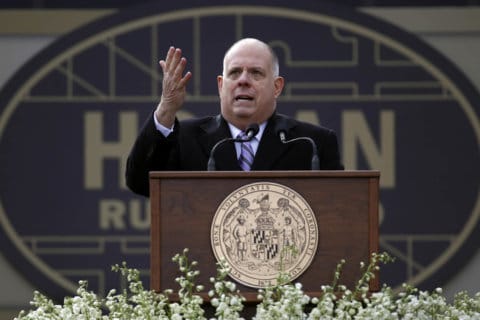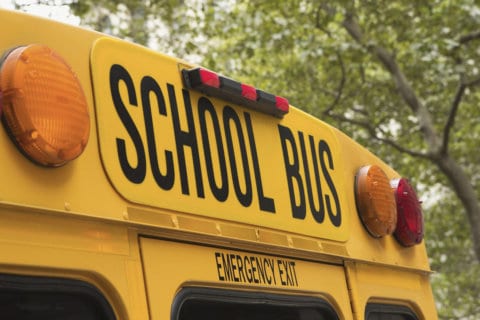ANNAPOLIS, Md. — Maryland Gov. Larry Hogan is vowing to keep the start date for the state’s schools after the Labor Day holiday.
In a news conference in Annapolis, the governor called criticism of his 2016 executive order that mandated all schools start after Labor Day “fabricated nonsense” generated by “special interests,” and he promised to fight bills to reverse the order.
“Sadly, this commonsense action is now being threatened by out-of-touch politicians and paid political operatives,” Hogan said.
Hogan said having schools start after Labor Day had been debated in the past — with strong support for the change, and cited a poll that said nearly 70 percent of Marylanders supported the later start date.
“We’ve taken a lot of actions over the past four years, but I can’t think of any action that has as much widespread, enthusiastic support as this one does,” he told reporters.
If the bill to reverse his order is passed and schools are given the ability to open before Labor Day, the governor said he’s prepared to take a number of actions. First, he said he would submit legislation to codify his 2016 executive order into statute.
Hogan also said that would include requiring any local school system looking to change the start date to put the question to a referendum within that jurisdiction.
Hogan warned: “I just want to be on record saying that I assure you that any school board that actually attempts to subvert the will of the people in that jurisdiction — those hearings are going to be packed with people who will be letting the local school board know how they feel about trying to make that change.”
Finally, Hogan said if lawmakers move ahead with their plan, he would move to put the question to a statewide referendum.
In that case, he said: “There will be a petition to referendum. They will gather the required signatures from one corner of the state to the other. It will be placed on the ballot, and there is a 100 percent chance that the voters will overturn any action by the legislature with a more than 70 percent vote and school after Labor Day will remain the law in this state.”
Outside the House chambers, Del. David Moon, said given other pressing issues facing lawmakers, from health care to employment issues, he found it surprising that Hogan would put such emphasis on the school calendar bill.
“The idea that he would go and try to gather signatures on the issue of having school start after Labor Day — I mean that’s the definition of misplaced priorities,” Moon said.
Del. Vaughn Stewart said, “local jurisdictions should be able to decide local issues like local school calendars.”
Hogan said the current law allows schools to set their own academic calendars; it just requires that schools start after Labor Day.
Del. Eric Leudtke said, “I think there is interest statewide in making this a local decision,” and he insisted that the change would not affect school systems where the later start date is favored. “
“If school systems on the shore want to start after Labor Day, that’s great,” he said.
He also noted that many school systems schedule days off that are unique to their jurisdictions. He mentioned Frederick County’s decision to give students time off during the Great Frederick Fair.
“They do things like that all over the state but it should be a local decision,” he added
Leudtke also said that school systems — such as Montgomery County — where an earlier school start date was in place before 2016, wanted to start before Labor Day to ensure more instructional time to children, many of whom face economic and social disadvantages.
“Longer summers disproportionately hurt students of low income,” Leudtke said. “We know that a longer summer means middle-class families in Maryland have had to pay more for summer day care.”
Hogan dismissed objections that suggest a later school start date hurts students, saying “All of that of course, is completely fabricated nonsense.”
During floor debate on the bill to reverse Hogan’s 2016 executive order, Senate President Mike Miller said he had favored the move to push the school start date to after Labor Day. But noting that Maryland’s education rankings had fallen in recent years — Maryland’s schools rank eighth in the nation according to a 2018 Quality Counts report — Miller said he’s changed his mind.
“Times change, circumstances change, and there’s reasons why votes change — and this is the reason my vote is changing on this issue,” he said.









